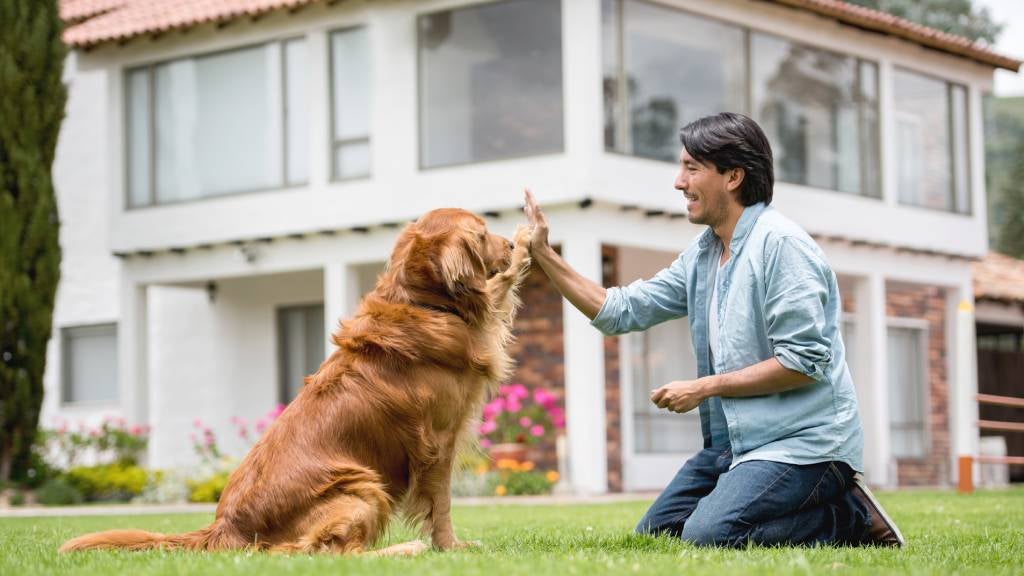6 helpful training tips for dogs

Whether young or old, all of our furry mates can benefit from learning some basic commands and good manners. After all, having a well-behaved dog gives them the freedom to do the things they like to do; like running off the leash and coming with you to meet friends and whanau; while being safe, under control and happy.
If you’re starting out with a puppy then the first few months are all about socialisation. Start by introducing your puppy to a variety of senses like sights, sounds, people and experiences. Let them meet adults, children, visitors and well-tempered older dogs, allowing them to approach in their own time. It is important that new experiences are positive, not neutral or scary. Many vet clinics also run puppy preschools that are a great way to get them started on making new buddies. A well-socialised pup will be able to cope with all the situations they’re likely to encounter later in life, rather than growing up shy or fearful. You can find more information on training methods here.
Here are a few basic training tips to help get you started on your training journey:
Your house rules
Decide what you want your furry companion to be able to do at home. Is being on the furniture ok? Are any areas off-limits like your bed? Do you have children who will need to be supervised as well? Setting the rules early on and being consistent will avoid confusion for your new family member.
Set the scene
Distractions and stressful situations don’t encourage learning, so keep them to a minimum when training something new. Being consistent and reliable for your dog means this behaviour is more likely to be reflected back by your dog. Be patient as individual dogs learn at different rates just like us humans. Get into a regular routine for training sessions but keep them short (5-10min) and fun so they don’t get overwhelmed and lose motivation.
Use fun rewards
Dogs are naturally social animals who are motivated to do what makes them feel happy and safe, which makes rewards-based training very successful. Who doesn’t like being rewarded? Giving your dog something they really like e.g. treat, toys or praise when they show a particular behaviour, means that they're more likely to do it again. The better the reward, the more your dog will enjoy training and learning!
Keep cool and positive
We all make mistakes especially when learning something new, but punishment is more likely to create fear than a positive learning experience. Instead, reward and reinforce good behaviour. Help them to make good choices by setting them up for success. Dogs live in the moment, so be quick and consistent when they display the appropriate behaviour, otherwise you may inadvertently reward the wrong behaviour.
Learn the language
Your dog isn’t born understanding human language so don’t expect them to understand what you say immediately. Help them by first guiding them into the desired behaviour using treats or a target and repeating until you can gradually fade the lure. At this point, you can add the cue with a consistent word or action like ‘stay’. Likewise, understanding a little bit of dog body language can go a long way to helping you understand how your dog is feeling and will reinforce that bond you will have forever.
End on a positive note
Finish with something they already know and do well, then you’ll both want to do more! If you’d like help with getting it right, then involving a professional force-free dog trainer can be super helpful. Preferably they will be registered with the Association of Professional Dog Trainers New Zealand or CANZ accredited. Your local dog training club may give you the opportunity to take part in more advanced training and even competitions if you wish. There are also fun online trick training titles. Dogs over 12 months of age can also join the Canine Good Citizen program which rewards dogs that set a great example for our communities.
Dog training can seem overwhelming at first but it doesn’t have to be. Spending time with your fur friend while training is a great way to build a strong bond with your dog, give them valuable skills, prevent boredom, and give them confidence for everyday situations in your home and community. And while you’re working at giving them the good life, consider taking out SPCA Pet Insurance - it’s another way to love them, and protect you.
10 Dec 2021